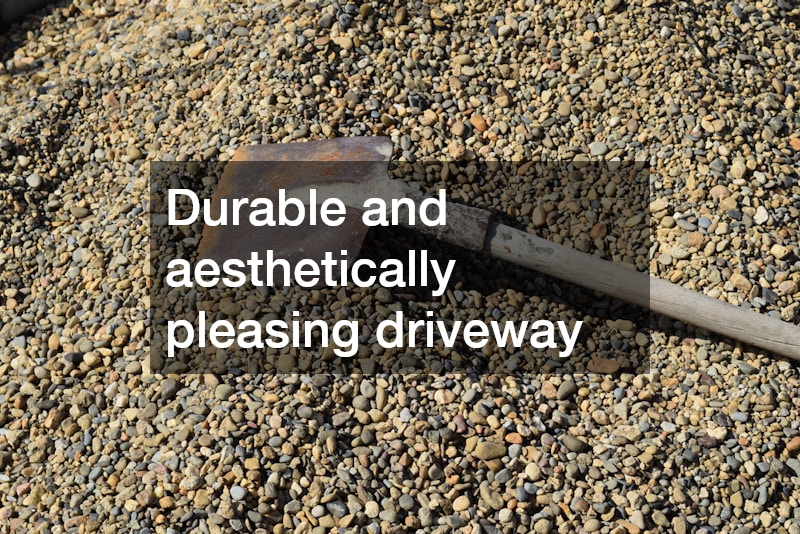This article explores the process and considerations involved in driveway gravel delivery. Understanding this process can help homeowners effectively plan and execute gravel installations for their driveways.
From choosing the right type of gravel to coordinating delivery logistics, proper preparation ensures a smooth installation.
What Types of Gravel Are Available for Driveways?
Common Gravel Types Used in Driveways
When it comes to driveway gravel delivery, homeowners have several options to consider. Crushed stone is a popular choice due to its durability and ability to form a solid base. Pea gravel provides a smoother surface and is often chosen for its decorative appeal. Another option is item #4, a mixture of gravel, sand, and clay that compacts well. The choice largely depends on personal preference and the specific needs of the property. Consulting with suppliers can provide insight into which type of gravel might best suit a particular project.
Each type of gravel has its unique properties, affecting drainage and stability. Understanding these characteristics helps determine the best gravel type for your driveway. Accurate selection minimizes maintenance and ensures a long-lasting surface.
Choosing the Right Gravel for Your Climate
Selecting gravel suited to your climate ensures the driveway can withstand the weather without deteriorating. It’s important to consider gravel options that offer excellent drainage to prevent water accumulation. Driveway gravel delivery involves understanding regional weather patterns. Gravel that is too loose can shift during heavy rains, leading to erosion problems. Options like crushed stone, which offer stability, are often recommended for challenging climates.
Considering the terrain is also crucial, as steeper driveways may require coarser gravel to improve traction. Consulting with local experts can provide valuable advice for selecting the right materials. Proper selection can significantly enhance the functionality and aesthetic appeal of the driveway.
Availability and Sourcing of Gravel
Sourcing from local quarries is advantageous. Local suppliers are familiar with the conditions and can provide gravel that is well-suited for the area. This reduces transportation costs and ensures timely delivery. Local conditions, including seasonal changes and terrain types, affect gravel options. Sourcing locally can provide peace of mind that the materials are appropriate for the landscape. Ensuring that the gravel meets local regulations and standards is another benefit of using regional suppliers.
Most gravel suppliers offer a variety of options for homeowners to choose from. It’s important to evaluate factors such as price, quality, and delivery times. Building relationships with reliable suppliers ensures consistent quality and service for future projects.
How Is Gravel Delivered and Applied?
Understanding the Gravel Delivery Process
Gravel delivery involves specific logistics to handle the material efficiently. Trucks equipped with specialized machinery transport and dispense the gravel. Scheduling deliveries according to weather conditions can prevent installation issues related to moisture and temperature.
Effective driveway gravel delivery requires coordination between suppliers and homeowners for optimal results. Timely communication helps ensure the gravel is delivered exactly where needed and without damage. It’s also crucial to handle permits or regulations that might impact delivery, particularly in residential areas.
Professional services often offer an end-to-end solution, handling the entire process from sourcing to application. This can be particularly advantageous for larger projects that require precise gravel placement. Understanding the delivery process helps in planning and managing the overall project timeline.
Preparing Your Driveway for Gravel Application
Preparation is a key part of a successful gravel application, ensuring the new surface is durable and aesthetically pleasing. The first step often involves clearing the driveway of any debris or vegetation. Leveling the ground and laying a solid base is crucial for stability.
Compacting the base material provides a firm foundation for the gravel. Moisture control is another important aspect of preventing water damage. Proper preparation helps the gravel adhere to the base material, reducing the likelihood of future maintenance issues.
In some cases, it may be necessary to construct adequate drainage systems to manage runoff effectively. Ensuring the driveway has the correct slope allows water to disperse appropriately. Addressing all these elements before gravel placement ensures a smooth, uniform surface.
Understanding the different types of driveway gravel and the delivery process can help homeowners make informed decisions for their driveway projects. Whether choosing DIY approaches or professional services, preparation and proper execution of gravel delivery ensures a durable and aesthetically pleasing driveway. By focusing on key elements like gravel type, the delivery process, and correct application, the project can significantly add value to a property.
.







